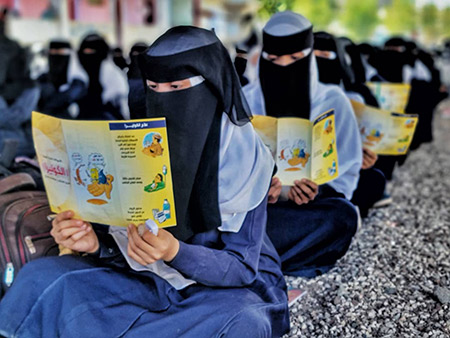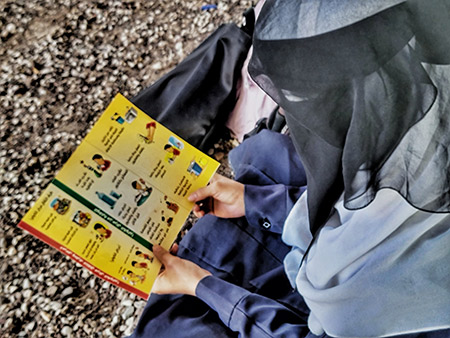 08 January 2025, Sana’a/Aden, Yemen – Yemen’s decade-long conflict has devastated health care infrastructure. The ability to conduct routine vaccinations, manage chronic diseases and respond to disease outbreaks has been severely compromised. As a result, preventable diseases like cholera, diphtheria, measles and dengue fever have spread rapidly through communities already weakened by poverty and malnutrition.
08 January 2025, Sana’a/Aden, Yemen – Yemen’s decade-long conflict has devastated health care infrastructure. The ability to conduct routine vaccinations, manage chronic diseases and respond to disease outbreaks has been severely compromised. As a result, preventable diseases like cholera, diphtheria, measles and dengue fever have spread rapidly through communities already weakened by poverty and malnutrition.
The World Health Organization (WHO) and the Ministry of Health recently conducted a series of training sessions to empower health education managers, health care workers and health education volunteers across 16 governorates. Around 365 trainees were equipped with vital information and enhanced understanding of disease outbreaks and the importance of adopting effective prevention measures.
In Yemen’s challenging environment, health education and information can play a transformative role. By raising awareness and sharing accurate information about community-level disease prevention and control communities are empowered to adopt practices that significantly reduce disease transmission. Simple actions like handwashing and safe food consumption make a substantial difference in preventing the spread of infectious diseases.
“Empowering individuals with knowledge and enhancing health literacy about common health issues and their symptoms enable vulnerable communities to seek timely medical help, reducing the severity and spread of illnesses. Community education campaigns also promote preventive measures such as safe water practices to prevent water-borne diseases like cholera,” said WHO Representative and Head of Mission to Yemen Dr Arturo Pesigan.
“The trained health care workers and health education volunteers will work within the National Health Education Centre’s strategy to bring vital health education directly to people, covering crucial topics and disseminating information that can be lifesaving.”
 Health education fosters a sense of community responsibility and resilience and allows communities to support each other and work together to maintain a healthier environment. By informing communities about available health care services and how to access them, more people receive the care they need, even in remote and hard-to-reach areas.
Health education fosters a sense of community responsibility and resilience and allows communities to support each other and work together to maintain a healthier environment. By informing communities about available health care services and how to access them, more people receive the care they need, even in remote and hard-to-reach areas.
By focusing on effective communication strategies, utilizing diverse communication tools and fostering functional community networks, volunteers are in a better position to engage with community members and promote positive health behaviours in response to health crises.
Active participation throughout the training enabled participants to expand their knowledge of key awareness raising and community engagement concepts.
“The training provided us with the tools and skills to deliver more effective health services. It also equipped us to respond to health crises in ways that align with societal needs and expectations,” said Mansoura District Health Office Manager Dr Abdul-Hakim Al-Moflahi.
“Effective, rapid and accurate communication mechanisms facilitate the transfer of health information and messages between community volunteers and community members, especially during vaccination campaigns. The broader and more robust these mechanisms are, the more likely it is that health interventions and other activities will succeed.”
Accurate health information helps combat misinformation and disinformation, guiding people towards safe and effective health practices. Integrating health education into community health programmes and leveraging local leaders and volunteers can help rebuild Yemen’s health care system from the ground up.
Ensuring that vulnerable populations have the knowledge and resources to protect their health is crucial to overcoming the current health crisis and building a healthier future for Yemen.
The programme was made possible by contributions from the United Nations Central Emergency Response Fund (CERF), the United Nations Office for the Coordination of Humanitarian Affairs (OCHA) and the World Bank Group. Collaborative efforts have been crucial in building the capacity of health education programmes, delivering vital health care services to those in need, improving health outcomes and building a more resilient health system in Yemen.


